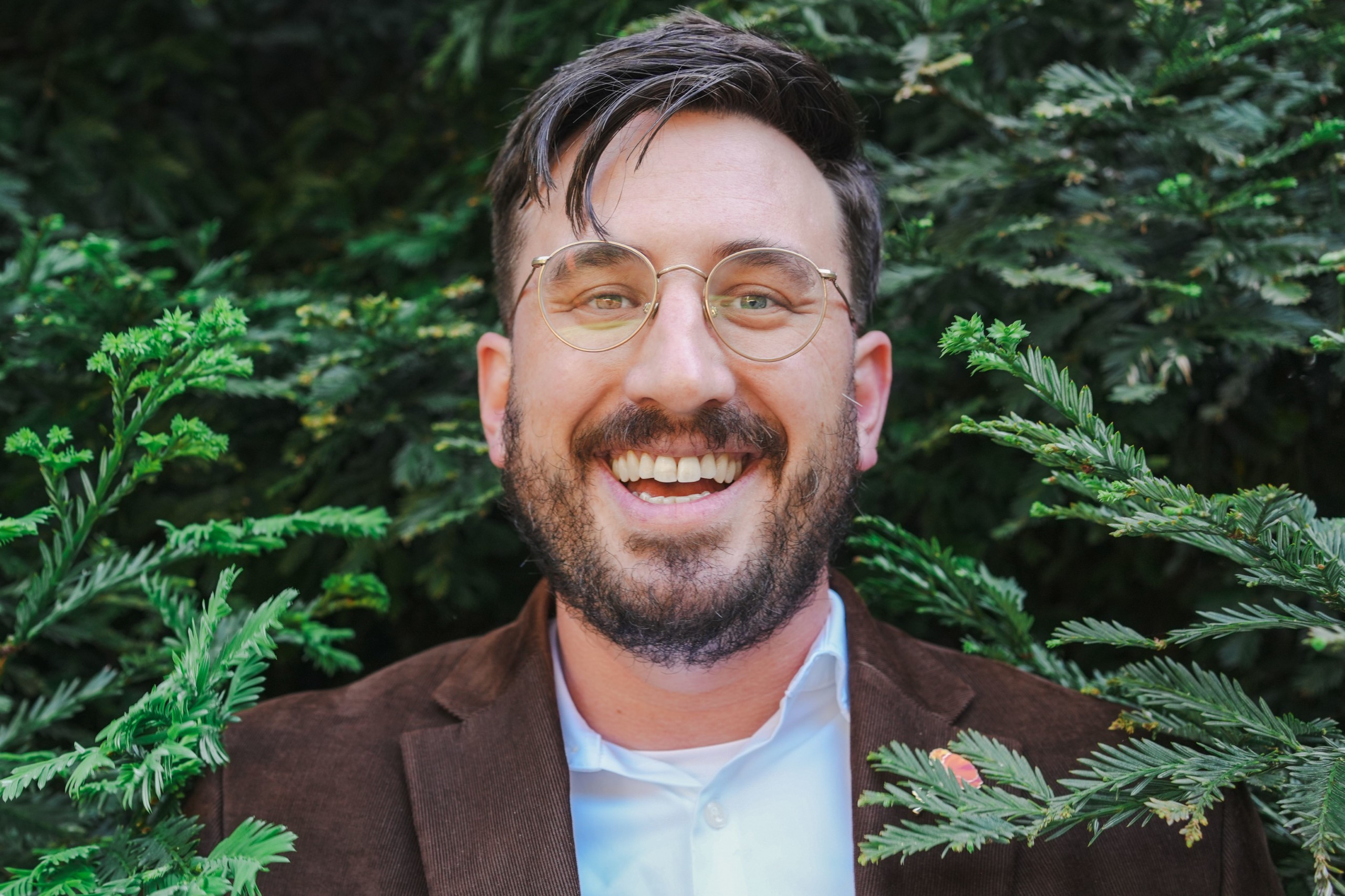
Preston Carmack ’13 is the Director of Marketing Communication for the Jesuit School of Theology at Santa Clara University. He leads the institution’s efforts in marketing, internal communications, and public relations. Carmack recently reached a major milestone, successfully defending his Ph.D. dissertation in rhetoric, titled “Narrative as Story and Ground: Toward A Dialogic Communication Theory of Narrative Care.” He credits his Bushnell University education with laying the groundwork for his path into higher education and institutional storytelling, especially the communication theory foundation he received as an undergraduate.
A musician and creative at heart, Carmack discovered a passion for storytelling during a Public Speaking 101 course at Bushnell, which inspired him to add a communication minor to his undergraduate degree. Those early experiences and the mentorship of faculty like Dr. Doyle Srader laid the groundwork for a career with roles in leadership and public communication. In this Q&A, Carmack reflects on his role in shaping institutional narratives, how Bushnell influenced his personal and professional direction, and his advice for aspiring communicators and storytellers.
Can you tell us about your current job and what a typical day looks like for you?
I am the Director of Marketing Communication for the Jesuit School of Theology of Santa Clara University. In my role, I am responsible for the institutional storytelling of the school, which includes marketing, internal communications, and public relations. I work with a small team that is incredibly talented and passionate about what they do. I am also part of the Dean’s cabinet and leadership team for the school. I’m not sure that there are any typical days in this position. Because we’re involved in storytelling, we need to be responsive to whatever emerges, whether they are exciting wins or potential crises. A couple of weeks ago, we were busy handling interviews and media requests for the Dean of our school following the passing of Pope Francis. I helped arrange interviews with CNN, The New York Times, and the NPR show On Point. This week, we are focused on commencement and telling the stories of our graduates. Each day is a bit of an adventure.
How did your education at Bushnell University prepare you for your career path?
My education at Bushnell University provided a foundational knowledge of communication theory that complemented my love for storytelling. As a musician and a creative, I have always been passionate about stories. My time at Bushnell helped me understand that communication theory can enhance a passion for storytelling. It offered me insights and tools to express care in interpersonal relationships and deepened my understanding of the craft of storytelling. I recently successfully defended my PhD dissertation in rhetoric, and I never would have started my path in higher education without the influence and encouragement of Dr. Srader.
What experiences or opportunities at Bushnell University were most influential in shaping your career?
For me, the most influential experience at Bushnell was Public Speaking 101. This class opened my eyes to the amazing stories we all carry and the power of compassion and empathy in bridging gaps between people. Because of that class, I added a minor in communication to my already hectic undergraduate schedule.
Can you share a significant challenge you’ve faced in your career and how you overcame it?
One significant challenge in my career was deciding whether or not to go back to graduate school. In 2018, I had been a creative arts pastor in my hometown for three years, and before that, I had been a touring “musicianary” with my rock band. Both roles centered around full-time ministry. I reached a point where I felt burnt out. I had not lost faith in God, but I had lost faith in the Church. I needed a change of pace and more tools to navigate the challenges I faced in ministry. I was particularly interested in communication because of my positive experience at Bushnell. Through prayer and the support of family and friends, I found a graduate program anchored in the Catholic intellectual tradition that offered hands-on learning for their master’s and PhD programs. Although it has been one of the hardest things I’ve ever done, the graduate program introduced me to Godly mentors, some of whom were former pastors, who challenged me and pushed me to grow. I found a framework for doing scholarship that engages the world with wonder and a commitment to seeking God’s revelatory work in everyday life. When I faced that crossroads in my career, it wasn’t just my efforts that helped me overcome the challenge; it was God’s grace and His work through my community that carried me through.
What advice would you give to current Bushnell University students who are interested in pursuing a similar career?
Say yes to every opportunity that allows you to tell stories. Whether as a social media intern, a copy editor, or a reporter for the student newspaper, good storytellers are always needed in any organization. Become as familiar and comfortable with various mediums for storytelling as possible. Try photography, audio recording, and both long and short-form writing. All of these experiences will equip you with more tools in your toolkit for telling compelling stories that are creatively rewarding and institutionally effective. In addition, I would encourage you to listen to the stories you are telling. Remember that real people live in those stories and should be treated with respect and genuine care.
To learn more about Bushnell University’s degree in communication, visit our website.